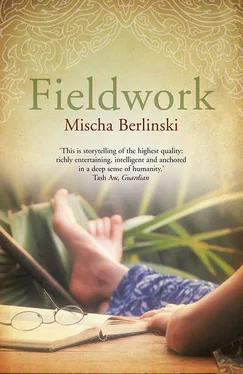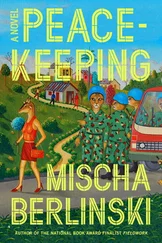Fine, fine words, to be sure — but, then, the only hard part of jumping off a cliff is hitting the ground. Until then you're flying . Three years in the Philippines, two years grinding out the dissertation, a few years in a tenure-track job which doesn't pan out, a bad marriage— bad! there ought be a whole new word for what it's like to be married to Ted —what they don't tell you in grad school is that the free and open empty feeling when everything about humanity seems like grist for the anthropological mill is just temporary, that it's on loan and goes away, and when it goes away, it's gone. Then throw a divorce into the mix, and step just slightly off that pedestal from hot-shot student under hot-shot adviser at a hot-shot university to lecturer with limited publications at a second-rate school — and watch how fast a career in anthropology no longer seems like a liberation but like a trap. Karen in 1983 read over that quotation she had given to the El Paso Deacon-Herald , and she simply couldn't believe how six years in academia had changed her. No wonder Martiya had decided to leave it all behind. Karen sometimes just wished that she had had the guts to do it too.
Karen and Martiya went into the field together in the same year, the fall of 1974, both twenty-seven years old, and, if anything, had grown more intimate at a distance. They exchanged lots of long letters, just to have the pleasure and relief of telling someone all of their strange new emotions; and although Martiya was in northern Thailand and Karen was in the southern Philippines, they felt as if they were going through the same immensely painful, immensely wonderful experience of first fieldwork together. Reading Martiya's letters, Karen started to feel as if she knew the Dyalo, and knew all the people in Martiya's Dyalo village. After they had been in the field for fifteen months, the two women, yearning for flush toilets, splurged and bought tickets to Paris for a three-week vacation. The whole time they were in France they talked tribe. Then they went back to their villages and exchanged more letters.
By the time Karen and Martiya got back to the States — this must have been 1977, three years or so after they left — Karen was really involved with Ted, and Karen and Martiya didn't live together again. Naturally they stopped writing each other — they lived just across town — and suddenly they were farther apart than when they had been in remote tribal villages, across oceans. They saw each other in the halls of the department, or met once every week or two for coffee, then once a month, then less, and by the time that Martiya did the unthinkable and bought herself a ticket back to Thailand, Karen was already at Penn, and she only found out that Martiya had gone back to Asia when a letter in Martiya's neat sloping handwriting, return address Thailand, arrived in her departmental postbox, the first letter from Martiya in almost a year.
For about four years, from 1979 to 1983, Karen and Martiya were only in vague contact. Karen was in Pennsylvania and Martiya was back in Thailand. There were one or two letters a year. Then came Karen's divorce, and losing the job at Penn and the move to Madison, and one evening as the wind whipped down from the North Pole, Karen, feeling very, very alone, wrote a long letter to Martiya, seven single-spaced pages, double-sided, complaining about those snows which started in November, and the long nights watching TV and eating ice cream straight from the tub. Something about Wisconsin made her feel fat, she said, in every sense: gross, heavy, immobile, sluggish. Three weeks later, Martiya replied, inviting Karen to visit her in Thailand over winter break—
And in any case (Karen said, still on the telephone, my ear aching now), oh my , she had been talking for hours, she had to go, but she'd tell me more when we talked again, and I was so nice to listen to her yak, but, listen , the reason why she was calling was, last fall when she got her new condo, she'd just put everything into the storeroom — books and papers and notes and twenty-three years' worth of Ethnology ; and one of the very best things about talking to me had been that it gave her an excuse to go down there and put a little order into her stuff. She knew she had Martiya's old letters somewhere, because she really was a packrat, and it had taken a little time, but in the end, she found a sheaf of old letters from her classmate and friend. She couldn't find all of the letters, chiefly because Ted never sent them to her and the lazy bastard probably still had them in storage, but she did find a bunch of them down in the basement, mainly from Martiya's first year out in the field. She stayed up all night reading them and chuckling and remembering, and man , was that a long time ago, first fieldwork. It's like nothing else.
Karen sent the letters priority mail; about ten days later a fat manila envelope stuffed with hundreds of photocopies arrived. It was fortuitous timing, because the next day Rachel and I went on vacation. I took the letters with me.
When Rachel had accepted the job at the school, Mr. Tim had mentioned that one of the perks of the position was the fabulous vacations. "Oh, my!" he said. "You will go everywhere !" Now, for the Thai New Year, Mr. Tim, good to his word, was taking his lover to tour the romantic ruins of Angkor Wat. Others were headed to Burma, to Laos, to Vietnam, to China. Mr. Robert was headed to central Thailand for a two-week course in Vipassana meditation; he would spend his vacation learning to hear the sound of his heartbeat. Even our neighbor, Baiyom, was headed back to her little village a half day's journey to the south, where, she announced, she intended to do nothing but eat and fart.
Rachel and I rented a houseboat in the floating village of Pak Nai.
It was a wonderful vacation. The banks of the river marked the boundaries of a national park, in which only a few of the hill tribes were permitted to settle, and so the whole village floats midstream on bamboo rafts: perhaps two or three dozen huts, the market, the temple, a typical Thai village. In the mornings, we awoke just after dawn, dove off the porch of our houseboat, and cavorted like river dolphins in the sparkling waters; then we climbed into our canoe and paddled off to the floating market and bought mangoes, finger bananas, and bottled water for breakfast. The policemen, pants rolled up to their knees, sat on the edge of their houseboat flopping their feet in the cool waters and saluted us as we cruised by. Could there have been a greater pleasure at the height of the hot season than to dive off the front porch of our rented houseboat and hear the hooting of the kiss-me birds greeting the full moon? Or a sweeter memory than dawn, when we were woken by the serene paddling of the monks, stopping by our houseboat to collect alms?
During the days, I read Martiya's letters to Karen Leon. I had them in a three-ring binder. "Dear Karen," Martiya wrote; and "Karen honey," and "Hi Kit-Kat!" I lay out in the sun and read letters about Martiya's boring dreams, and letters interpreting Karen's boring dreams; then letters describing Martiya's Dyalo hut and letters about Dyalo food; letters describing how hard it was to learn the language. The correspondence was of necessity one-sided, because Karen didn't send me her responses. The letters covered the better part of a year, September 1974 until August 1975. Each eight-and-a-half-by-eleven-inch page was the photocopy of a slightly smaller unlined stationery sheet. Each letter was dated: some letters were written on consecutive days, other letters were separated by as much as two weeks. Most of the letters were about three to four pages. There were fifty-three letters in all.
Читать дальше












